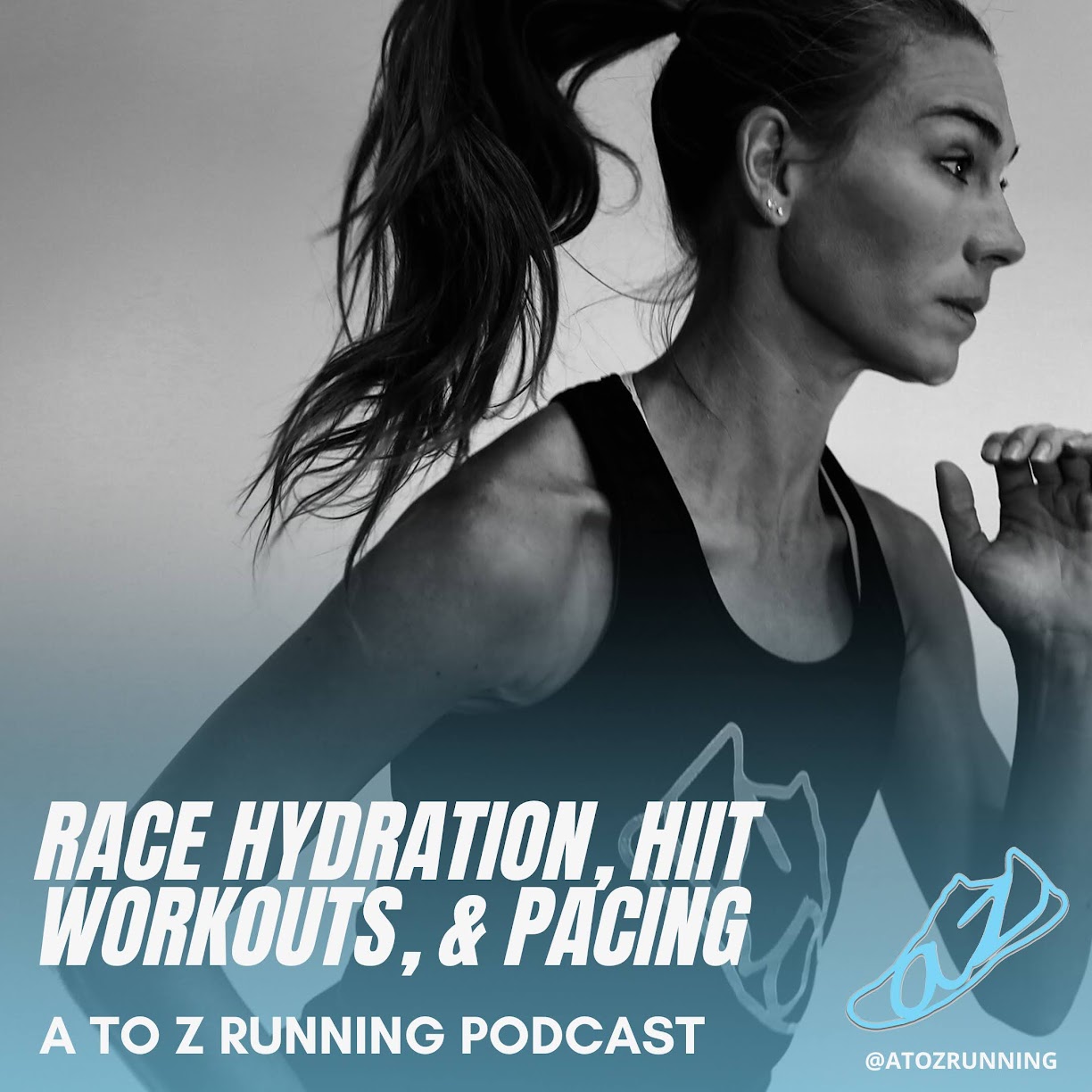LISTEN
In this episode of the A to Z Running Podcast, Zach and Andi and listener Q & A about race hydration, HIIT workouts, & pacing.
Stick around after that for the latest from the world of running.
INTRO
-
-
- FOLLOW and SUBSCRIBE
- Thanks for joining in on the conversation on social media. Please say hello if you see us at races!
- Ask a question!
- Hip Hook, code: AtoZ
-
MAIN TOPIC: WET SHOES, HAMSTRINGS, AND COMPARING DISTANCES
Today’s episode comes from questions you’ve sent into A to Z Running!
From Kristi
I have done some 1 mile time trials in the past and they never went very well for me. I am curious on how to pace a 1 mile race like Magic of the Mile.
- Mile is one of the most straightforward distances to race (pros and cons to that…)
- Commonly believed that in a mile, you get one strong move, maybe two…
- It is basically one of two things depending on the goal: if the goal is to try to win the race or if the goal is to try to run as fast a time as possible
- If to win the race, then the goal needs to be to run as hard as you can for 3 laps while having as much energy as possible still left for the final lap. So it is a two-phase race: strong for 3 laps, everything you got for 1
- If to run a fast time regardless of contest, the strategy is more about running even. The mile is short enough that you can run entirely anaerobically without falling apart because the body should be able to handle 5-8 minutes of anaerobic running without substantial negative effects… SHOULD. There is a lot of nuance there depending on training and some other things. In any case, it’s the same mindset: going strong for 4 laps is a balancing act of teetering on the brink of overdoing it the entire time.
- It should ideally look like this: first lap you get out and are running strong, but you can’t be out of control (or there’s no hope in holding for 3 more laps…); next two laps is about holding that pressure; last lap is draining the well if there’s anything left or holding on if not. When you run a mile at your maximum possible potential for the distance, it almost always feels like: 1 lap reasonably uncomfortable but not straining, 2 lap starting to work, 3 lap feeling the challenge, 4 lap changing gears into go for broke mindset (which either means accelerating or holding depending on how much is left)
- But the key consideration with these short distances is that the nature of preparation has a lot to say about how we might be able to feel while running a good strong mile. They hurt bad for distance runners who aren’t specifically trying to prepare for them!
From Haley
Can HITT style workouts be beneficial to Endurance athletes? If so, why or why not?!
- If your goal is to burn calories, then HIIT is effective.
- Benefit- muscular strength.
- Lots of neuromuscular coordination and leg strength that can be helpful to runners. Great for the off season
- There are claims that HIIT helps you to increase your aerobic fitness. While there may be an initial increase in fitness, the studies cited are not long enough to make this claim.
- Quick gains- similarly to interval work, HIIT workouts can help you to improve quickly, but have serious limitations.
- HIIT workouts interfere with most training schedules for endurance athletes because they take too long to completely recover from. Consider doing partial reps without going anaerobic for a leg strength routine in addition to your training.
- Better yet, we have two leg strength circuits that would serve you as a distance runner even better.
From Pete
Looking at Keira D’Amato’s Strava World’s marathon post, I see her pace fell off around mile 16ish…what’s magical around the 16-18mi range that runners from mid-packers to elite causes them to fade? Zach, I recall you mentioning that was roughly the area at Bayshore. At one point I thought it was a time-based point of fatigue, but is there a mileage based one? Or is it in the head?
- Bayshore reference: 16-18 is when I started to notice issues with my quads; at that time, knew they wouldn’t last but wasn’t struggling yet…
- Couple things we know:
- At some point in a marathon, there’s a good chance you run out of readily available energy (glucose in the blood, etc.)
- This energy store is about the same for everyone
- Controlling for all the important variables, it is expected that if a runner wants to end a marathon with exactly 0 energy left, that runner will likely expend about the same amount of energy per mile as any other runner
- Most of us are burning about 100 calories/mile
- If we have about 2,000 available storage, we need to account for another 500-600 calories of consumption
- OR we have to reduce how many we are burning
- OR we have to be able to access energy another way
- But release control of those important variables…
- Zach is going to go into speculation mode for a little bit…
- The difference in faster marathon pace vs. slower is that the faster you can cover the distance, the greater percent of maximum you can sustain
- This makes sense because your energy lasts for a different amount of time
- (ex: 3.5 hours vs. 2.5 hours…)
- But is there a magic consideration about 16-18mi?
- Not really…
WORLD OF RUNNING
World of Running
- Hannah in 50k,
Kathy in Tri relay,
Dan O first in AG 5k & 10k
Julie first in AG 5k, 2nd in 10k
Martha 5k, 10k
Mark 5k, 10k
Andrew 10k, 3rd AG
Cross Country: Zach Step, Erica, Kelli
#1. Triple winner at US Masters Track and Field Championships
- Triple crown for 1996 Olympian Michelle Rohl in the 800m, 5000m, and 1500m.
- Michelle Rohl was a race walker who competed at three Olympics for the United States, with a best finish of 14th in the 1996 10K walk. She was a four-time USA Champion in the 20K, winning in 1999-2001 and 2003, and won five indoor national titles in 1995-95, 1998, and 2000-01.
- In the 800m she ran a blazing 2:23.24 in the women’s 55-59 800m to defend her title in that event.
- Rohl came only about a second away from her own American age group record and is the reigning 800m World Masters Athletics (WMA) Championships silver medalist.
- Rohl won the women’s 55-59 5,000m (18:33.83), which she also won in 2021 and at the WMA Championships in Finland this year.
- Rohl won the 1500m in 4:56.07.
#2. New Marathon Major?
(Source: Endurancesportswire.com)
- 3 candidates announced (they will not be accepting any more)
- All three could possibly become a new majors
- Cape Town (South Africa)
- Chengdu (China)
- Sydney (Australia – the latest announcement)
#3. Interview with Jake Wightman’s coach (and dad)
(Source Athletics Weekly)
- Geoff Wightman coaches Jake (and a few others)
- Some highlights…
- When asked about running vs. coaching kids, Geoff noted “I also think that everyone wants the best for their kids whether that’s careers, happiness or health. It’s a good question but I prefer to see our children progress and take pleasure in their achievements.”
- When asked about coming off a champs high: “If you are world champion, you’d be expected to win most races that you do but there will be times when he’ll line up out of season, in cross country races and he won’t be in 10/10 form and he’ll have to take that on the chin.”
Interested in a training plan and/or coaching? We offer personalized support to help you achieve your goals! KEEP LISTENING


 Dover Sikes CC Attribution 4.0
Dover Sikes CC Attribution 4.0
Leave a Reply
Want to join the discussion?Feel free to contribute!